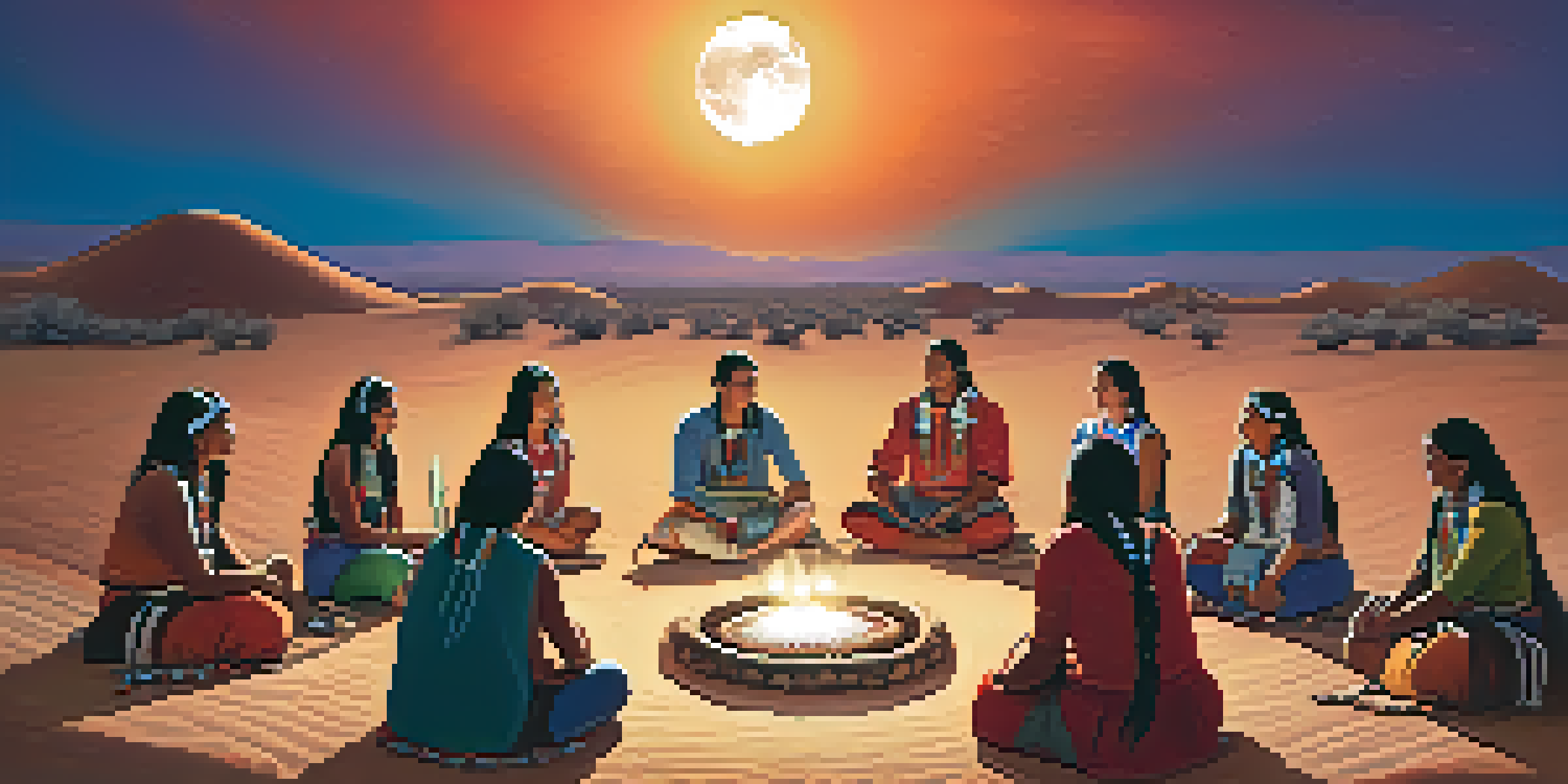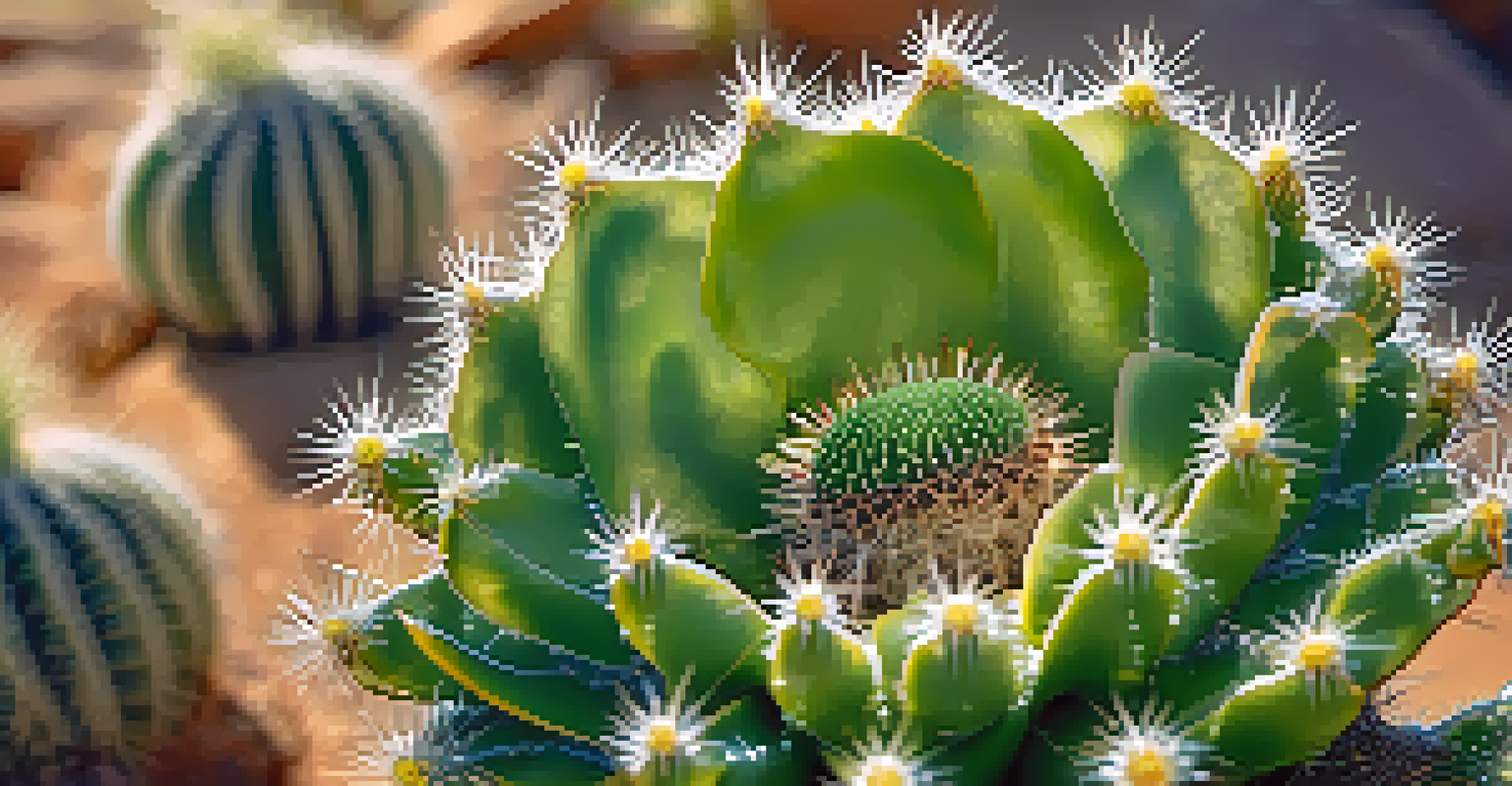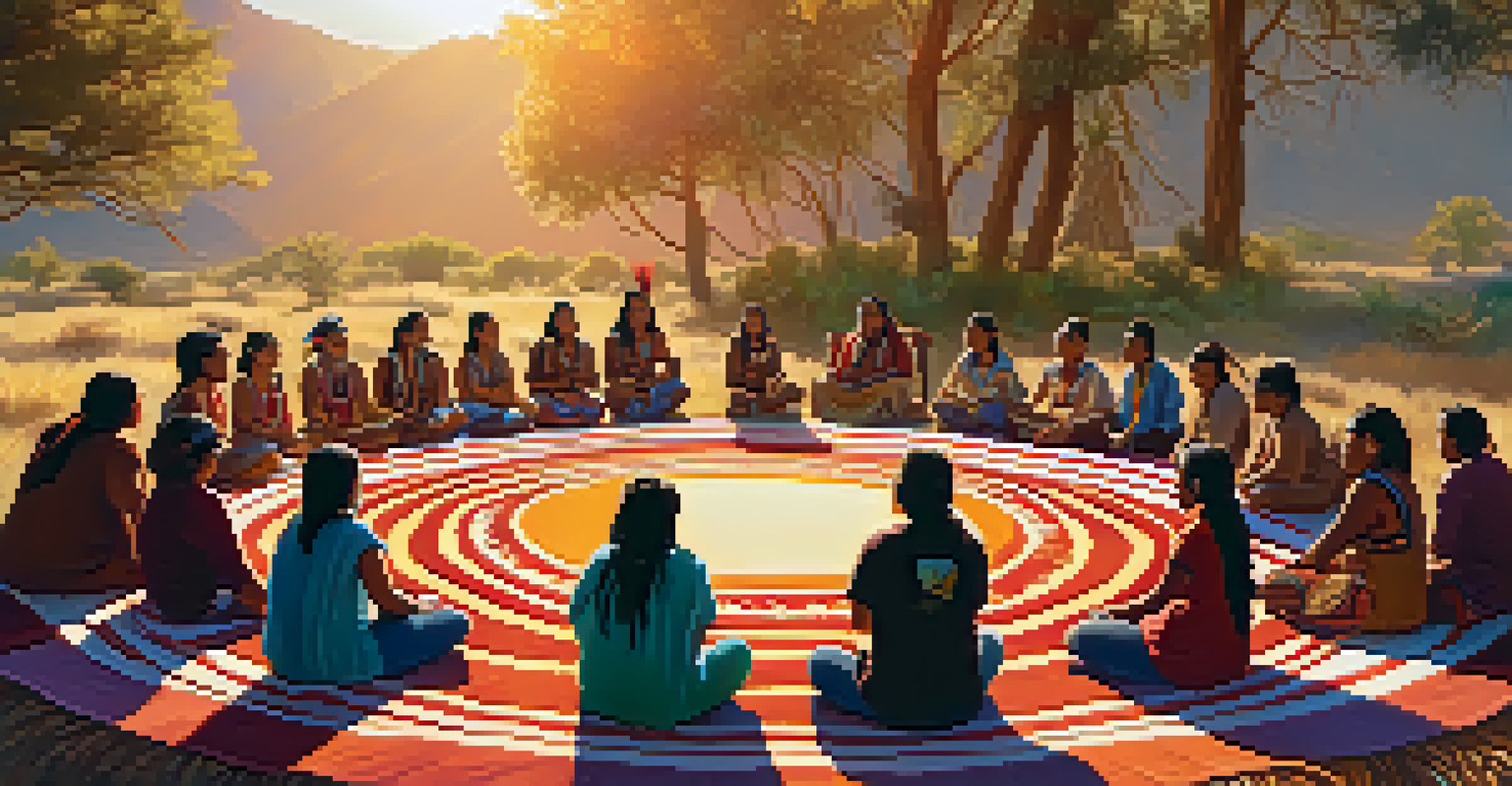Understanding Peyote's Spiritual Significance to Ancestry

The Role of Peyote in Indigenous Spirituality
Peyote, a small cactus native to Mexico and the southwestern United States, holds deep spiritual significance for many Indigenous cultures. Traditionally, it has been used in religious ceremonies and healing rituals, serving as a bridge between the physical and spiritual worlds. Its psychoactive properties induce altered states of consciousness, allowing individuals to connect with their ancestors and the divine.
The spiritual journey with peyote is a powerful reminder of our connection to ancestry and the sacredness of the earth.
For many tribes, such as the Huichol and the Native American Church, peyote is seen as a gift from the Creator, symbolizing a spiritual journey. This connection fosters a sense of community and shared identity among participants during ceremonies. By consuming peyote, individuals often report profound insights and a greater understanding of their place within the universe.
Through these ceremonies, peyote helps preserve cultural heritage, teaching younger generations about their ancestry. The rituals surrounding peyote use emphasize respect for nature and the interconnectedness of all beings, reinforcing the belief that understanding one's ancestry is key to spiritual growth.
Historical Context of Peyote Use Among Indigenous Peoples
The use of peyote dates back thousands of years, with archaeological evidence suggesting its consumption as early as 5,700 years ago. Indigenous peoples across North America have incorporated peyote into their spiritual practices, often blending it with traditional songs, prayers, and storytelling. This rich history showcases the plant's integral role in their cultural narrative.

As European colonizers expanded into Indigenous territories, peyote's use faced significant challenges. Many tribes sought to maintain their traditions, often using peyote as a form of resistance against assimilation and cultural erasure. This defiance highlights the resilience of Indigenous communities, who continue to honor their ancestors through the use of peyote.
Peyote's Role in Indigenous Spirituality
Peyote serves as a spiritual bridge, connecting individuals with their ancestors and the divine during traditional ceremonies.
Today, the importance of peyote in indigenous spirituality remains strong despite ongoing legal and social battles. Efforts to protect the rights of Indigenous peoples to practice their traditions have gained momentum, allowing for a revival of ancient practices that honor their ancestors and cultural heritage.
Cultural Significance of Peyote in Modern Celebrations
In contemporary times, peyote rituals have adapted to incorporate modern elements while still honoring ancestral traditions. Celebrations such as the peyote ceremony serve as powerful communal gatherings, fostering unity and reinforcing cultural identity. Participants often dress in traditional regalia, which adds to the ceremonial experience and connects them to their lineage.
In every culture, the ancestors are a bridge to the divine, and peyote helps us walk that path.
These modern ceremonies often include storytelling, drumming, and singing, which help create a sacred space for reflection and connection. The act of sharing personal experiences during these gatherings strengthens bonds among participants and reaffirms their commitment to preserving their ancestry. This sense of community is crucial for maintaining cultural continuity.
Moreover, as more people learn about the significance of peyote, interest in Indigenous spiritual practices has grown. This increased awareness encourages dialogue and education, allowing for a deeper understanding of the challenges faced by Indigenous communities. By engaging with these traditions, individuals can appreciate the importance of ancestry and the role peyote plays in spiritual journeys.
Psychoactive Properties of Peyote and Spiritual Insight
The psychoactive compound in peyote, mescaline, is known for inducing profound altered states of consciousness. These experiences can lead to deep introspection and a heightened awareness of one's spiritual journey. Many participants report feeling a strong connection to their ancestors during peyote ceremonies, often receiving guidance and wisdom from them.
During the peyote experience, individuals may encounter vivid visions, which can be interpreted as messages from their ancestors or the universe. This unique aspect of peyote use allows for personal revelations that can significantly impact one's life path. Such insights often provide clarity on family histories and ancestral legacies.
Challenges to Peyote Sustainability
Overharvesting and legal restrictions threaten the availability of peyote, impacting Indigenous peoples' ability to practice their spiritual traditions.
Importantly, these experiences are not just personal but are shared within the community. The collective nature of peyote ceremonies fosters an environment where individuals can discuss their experiences and connect over their insights. This shared understanding reinforces the communal aspect of ancestry, making spiritual growth a collective endeavor.
Challenges Facing Peyote and Indigenous Spiritual Practices
As interest in peyote has grown, so too have the challenges surrounding its use. Overharvesting and environmental changes threaten the cactus's survival, raising concerns about sustainability. This situation emphasizes the need for responsible practices and conservation efforts to ensure that peyote remains available for future generations.
Additionally, legal restrictions on peyote use can hinder Indigenous peoples' ability to practice their spiritual traditions. Although some protections exist, ongoing debates about religious freedom and cultural appropriation complicate the landscape. These issues highlight the importance of advocating for Indigenous rights and preserving cultural practices.
Despite these challenges, Indigenous communities remain committed to using peyote as a means of spiritual connection and cultural preservation. Their resilience in the face of adversity serves as an inspiring reminder of the significance of ancestry and the role peyote plays in their spiritual journeys.
The Role of Ancestors in Peyote Ceremonies
Ancestors play a pivotal role in peyote ceremonies, often serving as guiding spirits for participants. Many individuals enter these ceremonies with the intention of connecting with their ancestors, seeking wisdom, healing, or closure. This act of honoring those who came before fosters a sense of belonging and continuity that is crucial to spiritual growth.
During the ceremonies, participants may call upon their ancestors through prayers and offerings, creating a sacred space for communication. This interaction reinforces the belief that ancestors continue to influence the living, providing support and guidance throughout life's challenges. It emphasizes the importance of maintaining a relationship with one’s lineage.
Cultural Importance of Ancestors
Ancestors play a vital role in peyote ceremonies, guiding participants and fostering a sense of belonging and continuity within the community.
As participants share their experiences, stories of their ancestors often emerge, enriching the communal atmosphere. This storytelling aspect not only deepens personal connections but also strengthens the cultural fabric of the community. By honoring their ancestors, individuals contribute to a legacy that transcends generations.
Conclusion: Embracing the Spiritual Journey with Peyote
Understanding peyote's spiritual significance within ancestral practices offers a window into the rich tapestry of Indigenous cultures. By connecting with their roots through peyote, individuals embark on a profound journey of self-discovery and communal bonding. This connection to ancestry is vital for nurturing cultural identity and preserving traditions.
As we learn more about the role of peyote in these spiritual practices, we can appreciate the complexities and challenges faced by Indigenous communities. Engaging with these traditions fosters respect and understanding, allowing for meaningful dialogue about cultural heritage. It's essential to support Indigenous rights and the sustainability of peyote for future generations.

Ultimately, peyote serves as a powerful reminder of the importance of ancestry in our lives. Whether through personal reflection or communal celebrations, the spiritual journey with peyote enriches our understanding of ourselves and our place in the world.